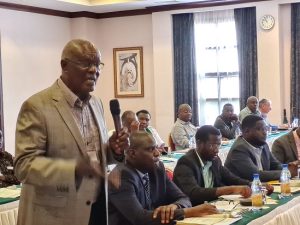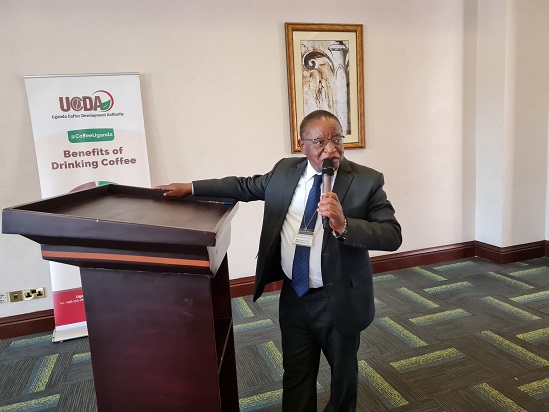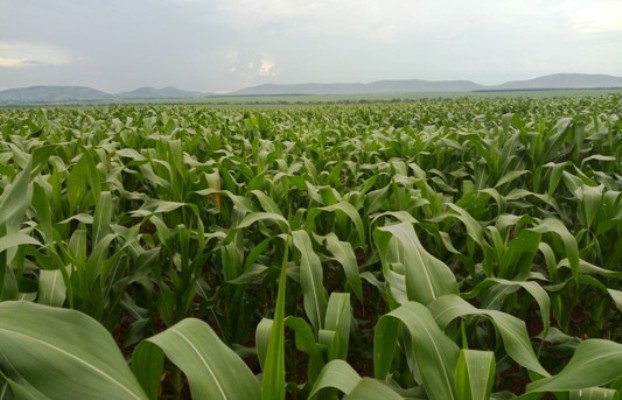Prof. Ezra Suruma says the existence of UCDA as an institution has been indispensable to the orderly expansion of the coffee sub sector.
Coffee stakeholders have unanimously urged Government to consider rescinding a decision to merge Uganda Coffee Development Authority (UCDA) with the Ministry of Agriculture, Animal Industry and Fisheries (MAAIF), saying the latter is over loaded and that Uganda’s ‘cash cow’ may not be given the necessary priority it deserves.
This came to light during the recently concluded National Coffee Dialogue on developing Uganda’s coffee value chain that took place from 10th to 11th January 2023 at Lake Victoria Serena Hotel, Kigo. The two-day event was organized by the Office of the President in conjunction with Operation Wealth Creation (OWC) and UCDA.
While concluding his presentation on the overview of Uganda’s coffee sector on day one of the dialogue, Dr. Joseph Muvawala, the Executive Director at National Planning Authority (NPA), asked the participants who included farmers, representatives from farmer groups and cooperatives, researchers, Government Ministries and Agencies, roasters, baristas, processors and exporters, among others, to deliberate on the institutional framework stakeholders want to operate in given coffee’s importance to Uganda’s economy.
Reacting to Muvawala’s submission, Prof. Ezra Suruma, who was key in the creation of UCDA in 1991, said: “The existence of Uganda Coffee Development Authority (UCDA) as an institution has been indispensable to the orderly expansion of the coffee sector.”
He added: “I think really that we must grow up. You can’t run an economy without institutions. If you have an institution working well, why abolish it? Coffee production has grown from three million to eight million bags in a period of five years (due to UCDA’s efforts).”
He said that many countries are bench-marking on Uganda’s success coffee story which has been possible due to UCDA.
He said there’s need for prioritization for Uganda.
“Each Ministry has their own priorities and coffee may not be a priority if UCDA is taken to MAAIF,” Prof. Suruma said.
He added that President Yoweri Museveni gave a policy directive to make coffee a key priority and UCDA has taken the President’s directive seriously.
He said Uganda should preserve institutions that are performing well.
“Institutions are known for methods of doing something; if you have a tested mechanism that works, then you must maintain it. The Americans say if it’s not broken, then don’t fix it. This thing (UCDA) isn’t broken. Then, why are you abolishing it? There’s nothing wrong with it,” he said, adding: “We must insist on preserving institutions that we have and are working. Don’t dissolve them.”
Suruma further asked Government to support local/indigenous participation in value addition.
Speaking at the same event, Robert Kabushenga, a coffee farmer, asked Government through the Permanent Secretary at Ministry of Public Service to “leave our UCDA alone.”
He said if UCDA is taken to MAAIF, Uganda will pay a very high price five years from now.
“Two countries have tried it out and failed. We didn’t have participation in arriving at that decision (to merge UCDA with MAAIF) and there are reasons why,” he said.
He said stakeholders want to deal with people who understand the sector well.
“Let’s deal with people who understand us properly. If we are too expensive, leave us alone and we fund it ourselves. We’ll find the money. We (UCDA) are not a cost centre. UCDA is a revenue centre,” Kabushenga said, amid applause from participants.
Gerald Ssendaula, the former finance minister and the Chairperson of the National Union of Coffee Agribusinesses Farm Enterprises (NUCAFE), a coffee farmers’ national organisation, said not everything that needs to be done must be under a ministry.
“Let’s really appreciate that we can do a lot more where we have specialized people ready to work for this nation, for whom we can set targets to run the affairs of the coffee industry,” Ssendaula said.

Speaking to Business Focus on the sidelines of the event, John Musila, the Bubulo East MP and the Vice Chairperson of Bugisu Cooperative Society (BCS), said he supports the idea of retaining UCDA as an independent entity.
“We can rush to merge (UCDA with MAAIF), but we’ll reintroduce it again. There are some MDAs that you can’t merge. We are now the world’s 7th coffee producer. With all the achievements in the coffee sector courtesy of UCDA, why abolish it? What were those miracles before UCDA? We have the National Coffee Act, 2021 that streamlines the coffee sector. We can only perfect UCDA in case there are gaps,” Musila said.
He said there are many farmer MPs that are against the idea of merging UCDA with MAAIF.
In another exclusive interview with Business Focus, Joseph Nkandu, the Executive Director at NUCAFE, said there’s no need to merge UCDA with MAAIF, saying coffee is very specialized and thus, needs specialized people.
“Coffee world over has become very specialized in a way it is grown. It requires specialized coffee extension workers. The way it is traded, it requires very specialized entrepreneurs and along the entire coffee value chain, there are different skill sets that are required and these are acquired over a period of time. If you want Uganda to earn better returns from coffee, then you can’t mix it up with other commodities,” Nkandu said, adding that UCDA has people who have accumulated knowledge about coffee.
He said Government should rather strengthen UCDA to play its role very well for the benefit of the country.
“Prioritization is very important. Coffee isn’t like any other crop. It’s the second most traded item globally after oil. We have moved away from earning an average of US$200m in the early 2000s to now earning over US$800m annually. This progress that we have achieved, we need to sustain it with an institution that has had experience, that has accumulated knowledge and that can regulate to the standards that are required within the country, Africa and the traditional coffee importing countries,” he said, adding:
“The name UCDA in the global coffee importing countries is a passport to the market. For us at NUCAFE, that’s what we stand for. We also believe UCDA is already within the Ministry of Agriculture; the governance of UCDA is determined by the Ministry of Agriculture; the UCDA Board is appointed by the Minister of Agriculture, UCDA reports to the Ministry of Agriculture. With the new law in place, this country is headed to earning more foreign exchange from coffee when the institution with experience is in charge.”
Gerald Katabazi, the CEO and founder of Volcano Coffee, also believes taking UCDA to MAAIF is a misguided idea.
“I would recommend that UCDA is strengthened to meet its mandate as it’s stated. MAAIF has so many agencies. Will we have immediate attention at MAAIF as a player with all those agencies? If UCDA is independent, I can channel my concerns to them and get sorted in a timely manner. We acquired a coffee export license from UCDA within five days. We got a roasting certificate within 24 hours. It’s effectively delivering on time. I don’t think things will remain the same if it’s moved to MAAIF,” Katabazi says, adding that there’s a lot of bureaucracy within ministries.
“This move is going to antagonize the sector and it may collapse if I am not mistaken,” he says.
Justine Kasule Lumumba, the Minister, Office of the Prime Minister (General Duties), who represented the Prime Minister Robinah Nabbanja to officially open the dialogue, pledged to deliver the coffee stakeholders’ concerns to her boss.
“Please pour out your emotions for your own good, for our own good and for the good of the people who are outside there. Please don’t fear because as you do that, you are helping us as Government. You are helping the President. He took oath on the 12th of May 2021 for the welfare of Ugandans. So when you pour out your emotions, you want to find solutions. You are helping him to score in that goal,” Lumumba said.
Last year, Uganda exported 6.3 million bags of coffee, the highest ever volume in the history of the country. This represents a 75% increment compared to the previous year.
In monetary terms, the coffee export fetched the country USD 826 million, representing 22 percent of the country’s foreign exchange earnings in the last financial year.
About Merging of MDAs
Cabinet approved the merging of 69 Government institutions-56 in the first phase and 13 in the second phase.
According to the Public Service Ministry, the expenditure by agencies stood at 37% of the national budget and with their merger, Government hopes to save about Shs650bn per annum.
The saving will come from wage and non-wage expenditure that Government has been allocating to agencies per annum.
According to Government’s compensation plan, 2,200 staff will be affected in the ongoing rationalization and merging of government agencies.
At the moment, two agencies including the Rural Electrification Agency (ERA) and the Science and Technology Ministry have already been mainstreamed to the energy ministry and Office of the President, respectively.
According to Government’s compensation plan, 2,200 staff will be affected in the ongoing rationalization and merging of government agencies.






